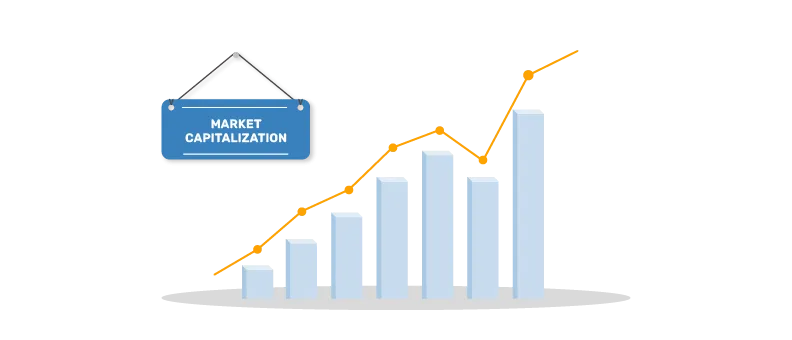Index funds have become an increasingly popular investment option for retail investors in India owing to their low costs, transparency, and ability to provide diversified market exposure. Index funds invest in securities constituting a market index, like Nifty 50 or Sensex, in the same proportion as the index, subject to tracking error.
A key feature of popular indices like Nifty and Sensex is that they are weighted by the market capitalisation of the constituent stocks.
- What is market capitalization weighting?
- Example of market capitalization
- How to calculate market capitalization?
- Types of market cap indices
- Advantages of market capitalisation-weighted Indexes
- Index fund investing - points to know
What is market capitalization weighting?
Market capitalisation, commonly known as market cap, is a measure of the total value of a company's outstanding shares. It is calculated by multiplying the current market price of a stock by the total number of outstanding shares.
For example, if a company has 1 lakh outstanding shares trading at Rs. 100 per share, the market capitalisation would be Rs. 1 crore (1 lakh x Rs. 100).
In market capitalisation weighted indices like Nifty 50 and Sensex, the constituent stocks are weighted according to their market cap. Companies with larger market caps have a higher weighting in the index compared to smaller companies.
The weighting of each stock in the index is proportional to its market cap relative to the total market cap of all index constituents.
Example of market capitalisation
Broadly, stocks may be categorised as large, mid and small caps. There can also be smaller companies, such as micro or nano caps. Here are some features:
- Large-cap
- Companies listed between 1 and 100 on the stock exchange
- Are typically well-established, with health balance sheets, strong fundamentals and relatively stable growth potential.
- Mid-cap
- Companies listed between 101 and 250 on the stock exchange.
- Offer higher long-term growth potential, with more volatility than large caps.
- Small-cap
- Listed 251 and beyond on the stock exchange.
- Offer high growth potential but entail significant volatility too.
How to calculate market capitalisation?
Market capitalization is calculated using the formula:
Current market price per share x Total number of outstanding shares
For example, if XYZ Enterprises has 130 crore outstanding shares and the current market price per share is ₹50, then the market capitalisation would be:
130 x 50 = Rs 6,500 crore
Types of market cap indices
There are three main types of market cap weighted indices, and they are mentioned below.
- Full market cap indices: Indices like Nifty 500, Nifty Full Midcap 100 and Nifty Full Small cap 100 are full market cap weighted indices. All listed companies are eligible for inclusion based on market cap, liquidity, and other criteria.
- Free-float market cap indices: In free-float market cap indices, only the publicly available shares are considered for calculating market cap, excluding shares held by promoters, strategic investors etc. For example, the BSE Sensex and the Nifty 50 indices.
- Equal weighted indices: As the name suggests, all constituent stocks are equally weighted in the index, irrespective of their market caps. For instance, if an index has 10 stocks, each one will have a 10% weight. Nifty Equal Weight Index is one such index.
Advantages of market capitalisation-weighted indices
Here are some of the advantages of indices that are weighted by market capitalisation:
- Reflects market performance:Market cap-weighted indices are aligned with the market’s overall performance (subject to tracking error), as larger companies have a greater impact on index movements.
- Simplicity and popularity: Widely recognized and easy to understand, market cap-weighted indices serve as standard benchmarks for performance comparison and fund tracking.
Index fund investing - points to know
Index funds are mutual funds that invest in stocks constituting an index, in the same proportion as the index. They aim to generate returns similar to the underlying index, subject to tracking error. Here are some key aspects of index fund investing based on market cap weighted indices.
- Since index funds follow a passive strategy, their returns closely track the underlying index over long periods. The fund manager does not try to beat the market.
- Index funds have relatively lower costs compared to active funds as there is minimal research and trading required. This can result in potentially higher net returns.
- Market cap weighted indices and the corresponding index funds tend to have a bias towards larger companies. This is because the largest stocks account for a big portion of the index.
- The performance of market cap weighted index funds is affected by the price movement of top index heavyweights. For instance, a rally in Reliance, TCS or other large-caps will lift index returns.
- Index fund investors get instant diversification at low cost as the fund invests in a basket of securities covering major sectors and industries.
- Since the fund manager does not select specific stocks, there is low risk of individual stock selection errors.
Index funds that track market capitalisation-weighted indices may experience substantial growth in their assets under management during periods of robust market performance by large-cap stocks. The assets under management and market increments in index funds typically correlate with the market capitalisation of the underlying constituents of the index.
Conclusion
Market capitalisation weighted indices form the basis of many popular index funds and ETF investment in India like those tracking Nifty 50, Sensex etc. The market cap approach results in larger companies having a higher representation in the index compared to smaller firms. Index funds provide passive exposure to the broad market at a low cost in a transparent and rules-based manner. For long-term investors, index funds can be a suitable way to participate in market growth.
FAQs:
What is the benefit of market cap weighting in indices?
Market cap weighting ensures that stocks with larger market values have a higher weight in the index.
How frequently are market cap weighted indices rebalanced?
Most market cap weighted indices are rebalanced periodically, ranging from quarterly to annually. This is done to account for changes in the market caps and weights of constituent stocks.
Are market cap weighted indices prone to bias?
Yes, such indices tend to have a bias towards larger companies since they have higher weightage. This may result in underrepresentation of smaller firms in the index composition.
Related Searches:
Mutual Fund investments are subject to market risks, read all scheme related documents carefully.
This document should not be treated as endorsement of the views/opinions or as investment advice. This document should not be construed as a research report or a recommendation to buy or sell any security. This document is for information purpose only and should not be construed as a promise on minimum returns or safeguard of capital. This document alone is not sufficient and should not be used for the development or implementation of an investment strategy. The recipient should note and understand that the information provided above may not contain all the material aspects relevant for making an investment decision. Investors are advised to consult their own investment advisor before making any investment decision in light of their risk appetite, investment goals and horizon. This information is subject to change without any prior notice.


